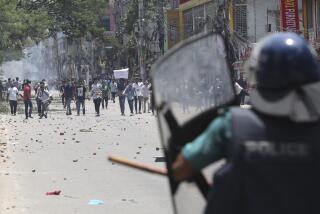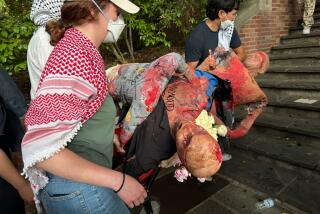Police, soldiers rout protesters in Bahrain
Reporting from Manama, Bahrain — They made their stand in a traffic circle known as Pearl Square a month ago, putting up tents, arming themselves mostly with sticks and rocks, and creating a bulwark of noisy protest that brought this tiny island nation nearly to a standstill and threatened its monarchy.
It took about an hour for the government to rout them.
Bahrain’s riot police and soldiers moved in at dawn Wednesday. They first seized the highway overpass that looks down on the square. Some protesters climbed the incline to engage them, but they were no match for the government troops.
The protest encampment was quickly defeated. At least three people — including two demonstrators — were reported killed and dozens more were injured, some of them peppered with buckshot fired by riot police. Smoke rose from the smoldering square Wednesday afternoon.
The Bahraini government crackdown had been expected and came a day after King Hamed ibn Isa Khalifa declared martial law and two days after troops from Saudi Arabia and police from the United Arab Emirates entered Bahrain at the invitation of the government. There were no signs that the foreign troops had participated in the crackdown in the square.
The conflict in Bahrain is as much a sectarian as a pro-democracy battle. Shiite Muslims, who make up a majority of Bahrain’s 600,000 people, have driven weeks of protest against the Sunni-dominated government over longstanding complaints that they are denied access to services, jobs and property.
The harshness of the action infuriated many of the protesters and raised the prospect that it would only intensify sectarian strife and demands for the overthrow of the monarchy. Protesters have called on the Sunni rulers to share power with the Shiite community; some also have demanded that the monarchy be eliminated.
“This shows that they are weak and afraid,” said Ali Mirza Marhoon, a Shiite protester, referring to the royal family. “They cannot prevent the people from demanding their freedom.”
Unlike those in some other Middle Eastern countries, Bahrain’s citizens do not own many personal weapons, making armed resistance, at least for now, unlikely.
But in a possibly ominous sign for the future, several demonstrators said they were prepared to become martyrs for the Shiite cause.
“We feel that we are invaded in our own country,” said Sayed Fadel, one of the demonstrators. After hearing that two protesters were killed Wednesday, he said many young men “are asking to be the next martyrs.”
Both sides knew the overpass above Pearl Square was vital. Demonstrators seized it last week, cutting off a main artery into the capital’s financial district. The demonstrators had built barricades of trash, sand and lumber to block the police from the bridge.
“We started seeing helicopters, and then the attack came,” said Mohammed Askari, who dashed to the overpass after seeing hundreds of troops massing.
Some ran and others, disoriented from the tear gas, tumbled down the hill. Hundreds of men in the circle below had gathered, intending to resist. Women and the elderly had already fallen back, part of an evacuation plan decided the night before.
Then, troops began firing from the overpass down on the protesters.
“I was facing them but they shot me, and when I turned they shot me again,” said Nabil Hassan Ali. His face and torso were covered with small, bloody marks from the buckshot.
As protesters rushed casualties to hospitals near the circle, security forces turned them away or fired on vehicles carrying the wounded, according to several witnesses.
Protester Ali Haji, pointing to the smashed window of his green car, said police fired on his vehicle as he drove up to the gate at the International Hospital of Bahrain. Dr. Hassan Moktar, a physician at the hospital, said a window in the lobby had been shot out. He said the hospital had treated about 50 patients from the square.
In addition, there were multiple reports that security forces and gangs of young Sunni men were clashing with Shiite protesters in neighborhoods and villages outside of Manama, the capital. One opposition member of Bahrain’s parliament called it a “war of annihilation” against Shiites.
More to Read
Sign up for Essential California
The most important California stories and recommendations in your inbox every morning.
You may occasionally receive promotional content from the Los Angeles Times.











